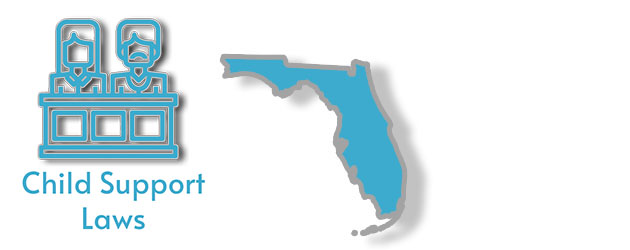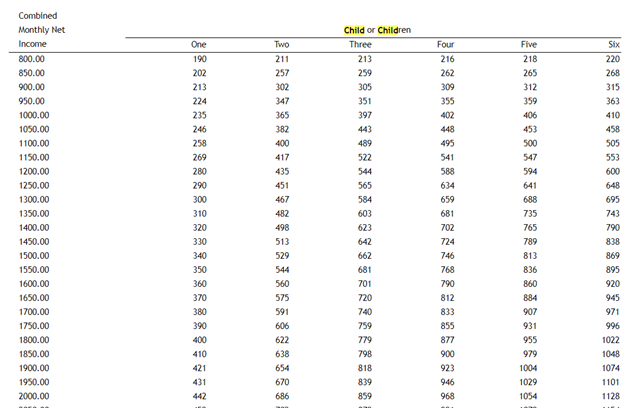
Everything you need to know about Child Support in the state of Florida. Updated 2020.
Florida child support guidelines are based on the principle that training, education, maintenance, and care of a child represent the obligation of each parent. That is according to Florid Statute child support law 39.01, consequently parents in the State are obligated to provide support for their kids. However, it is not uncommon for non-custodial parents in the state to feel cheated or unfairly treated after getting served with a child support order. This prompts the question; how does Florida enforce alimony?
In a general sense, what’s unique about Florida’s child support laws is that they encourage equal time-sharing and collaboration between parents. Thus, like many states, Florida uses a variation of the ‘Income Shares Model when deciding parental obligation.
If after reading this you have further questions and would like a consultation, you can get a free case consultation from a lawyer here.
- How is child support calculated in Florida?
- What is the maximum child support in Florida?
- Child Support Exemptions in Florida
- How do I enforce child support in Florida?
- What happens if you don’t pay child support in Florida?
- Can I go to jail for not paying child support in Florida?
- How much back-child support is a felony in Florida?
- When does child support end in Florida?
How is child support calculated in Florida?
Floridian family courts work on the presumption that child support should be equivalent to the amount the couple would have spent on the child if they decided to stay together. The model works like this:
- The Gross Incomes of the parents are combined.
- Based on combined income, the parental financial obligation is divided.
- The amount you pay is based on the percentage of total income contributed.
However, the higher-earning parent often pays more. Why?
As mentioned, the main consideration when calculating child support in Florida is the income of both parents coupled with the number of overnight stays. What do I mean?
For instance, assuming that one parent earns more than the other but there is equal time-sharing. The higher-earning parent would have to pay an “appropriate” amount and not a “fair” one. That means it would be considered unfair for the lower-income parent to match the higher-earning parent’s contribution.
Also, the problem with using calculators in Florida is, the amount varies depending on the following factors:
- Interests and dividends earned.
- Income earned from royalties, trusts, and estates.
- Spousal support from a previous marriage.
- Any income from self-employment, independent contracts, partnership, etc.
- Salary, bonuses, commissions, allowances.
Thus, the best place to get a close estimate is in court or from an experienced family court attorney.

That said. The important factor to remember is, the higher your income and the more the children, the higher the figure. See the snippet below for minimum child support.
What is the maximum child support in Florida?
Although there is no maximum child support figure, the chart used for estimations ends at $10,000. That means depending on the details of the case, the amount you pay may be higher. Remember, in Florida child support is determined on a case-by-case basis, and the figure can change should your income decrease or increase.
This raises the question.
How can I change my child support order in Florida?
Florida child support laws allow modification if the amount is at least $50 or 15% (whichever is greater). Furthermore, if one parent experiences a “substantial change in circumstances” such as loss of income or an increase or if the number of overnights changes. Either parent can petition the court for a modification.
Additionally, changes to the following expenses are grounds for child support order modification in Florida:
- Changes in daycare expenses.
- When alimony terminates.
- Other child support orders.
- Changes in payroll taxes.
- When health insurance premiums change.
But remember, each county in Florida has a slightly differing procedure for modification, so consult with a family court attorney in your county.
Child Support Exemptions in Florida
Although difficult to achieve, there are three scenarios where the courts might allow you to skip child support.
- Sign an agreement with your partner: signing an agreement with your partner can free you from any obligation, but, and that’s a big but, the judge has the authority to supersede your agreement, meaning, child support may be ordered even if both parents don’t need it.
- Lose your job or go to prison: although not automatic, the court may terminate child support agreements if you lose the source of, or ability to earn income…or if you are incarcerated.
- Give up your parental rights: although giving up your parental rights may free you from child support orders. It also takes away all your parental rights, meaning, your visitation, and contact rights may be withdrawn.
How do I enforce child support in Florida?
To get child support in Florida, the custodial parent must file a “petition” for support at the circuit court clerk’s office in your county. Find a petition here to get started. We recommend that you work with an attorney.
What usually happens after petitioning the court is. A hearing date is set where you will be required to present evidence of the child’s needs and your income. If an agreement is reached, the judge will formalize it, whereas, failure to reach an agreement will prompt the judge to decide for you.
This is where matters get serious. Florida takes child support very seriously, so we must ask:
What happens if you don’t pay child support in Florida?
Failure to adhere to Florida child support guidelines gives the other parent reason to file a “motion for civil contempt”. This can be done with the assistance of an attorney or you can do it on your own.
Regardless, what the custodial parent must demonstrate to the court is:
- The delinquent parent can pay. But chooses not to.
- The Delinquent parent has not honored his/her financial obligation.
- The child support order was approved by a judge (informal agreements don’t count)
Note: before judgment, the non-custodial parent will be allowed to provide a reason/s and why he or she can’t pay.
If it turns out that one of the parents was willfully and willingly not paying child support, the charges will be Contempt of Court.
Failure to pay child support remedies
- Income withholding.
- A payment plan may be established for the delinquent parent to follow.
- If $500 or more is owed, federal-state tax refunds will be withheld.
- Intercept lottery winnings of more than $600.
- The money will be taken directly from your account if you owe more than $600.
- Liens may be placed on property and vehicles.
- Property or assets may be sold.
- Your Home equity line may be frozen to keep you from spending.
- your worker’s compensation may be intercepted.
- Driver, professional, and recreational license suspension.
Can I go to jail for not paying child support in Florida?
According to Florida child support guidelines, you are eligible for a one-year sentence behind bars if you fail to pay or until the overdue is paid.
Can child support arrears be forgiven in Florida? Child Support Statute of Limitations
In Florida, there is no statute of limitations on back child support. That means the court has the freedom to pursue delinquent parents indefinitely. Accordingly, it is up to the judge to decide the extent of your arrears. That means evidence of income and obligations is very important for both parents.
Furthermore, the law allows the clerk of the court to impose interest on arrears.
To avoid punitive measures including possible jail time, it is in the best interest of the parent to make payments on time. However, some situations may occur that might make it difficult to honor the parental obligation. For example, you might lose your job. In such a situation, we advise you to contact Florida’s Department of Revenue, Court, or former partner and reach an agreement.
How much back-child support is a felony in Florida?
According to Fla. Stat. 827.06 and Fla. Stat. 77.5.082. if you owe more than $5000, or if you owe more than one year in back child support, you are eligible for 3rd-degree felony charges. The penalty for that is either a maximum sentence of 5 years or a $5000 fine.
A 1st-degree misdemeanor as mentioned above may carry a one-year sentence, or you may remain behind bars until you pay.
Remember, the court can order retroactive child support, which is different from arrears, in that, you may have to pay for support for a period before child support was ordered. To clarify, back support refers to the amount owed.
When does child support end in Florida?
Although Florida child support guidelines say that support ends when the child reaches 18. Payments may continue indefinitely if the child or adult is mentally or physically disabled.
On the other hand, the child might opt for emancipation.
Emancipation, in simple terms, is freeing your parents from their parental obligation. However, the following conditions must be met to be eligible.
- You must be at least 16 years of age.
- The child must be financially independent or capable of taking care of him/herself.
It is worth noting that emancipation doesn’t affect other laws such as voting age and drinking. Also, once you do it, your parents are no longer legally bound to provide food, shelter, and insurance. So, think long and hard before you make this decision,
On top of that, in Florida, even if you get emancipated. You cannot get married without your parent’s consent.
All in all, Florida child protection guidelines can be problematic to navigate on your own, so consult with a family attorney in your county or one who is closest to you. If you would like to speak with a local attorney you can get a free consultation about your case today.
More Florida Laws